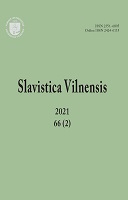Функционирование словообразовательных компонентов гомо- / гетеро- в русском языке
Functioning of Word-Forming Components гомо- / гетеро- in the Russian Language
Author(s): Tatiana Shkapenko, Evgenii ShapovalenkoSubject(s): Morphology, Comparative Linguistics, Eastern Slavic Languages
Published by: Vilniaus Universiteto Leidykla
Keywords: homo-/hetero-; word formation; prefixes of Greek origin; affixoids; composites;
Summary/Abstract: The article examines the features of functioning of prepositive components of Greek origin homo- / hetero- in the Russian language in a synchronic and diachronic perspective. The necessity of a differentiated approach to determining the morphological status of these components, depending on their meaning and use in a particular type of discourse, is substantiated. In scientific discourse гомо- /гетеро- are used as term elements denoting the homogeneity/heterogeneity of the defined part of the derivatives and perform the function of prefixes. There is a tendency to expand the scope of their functioning from the exact and natural sciences to the humanities. When used in the meaning of markers of sexual identification, the morphological status of these components is differentiated depending on the type of the derived word. As part of the composites, гомо-/гетеро- act as one of their derivative bases, in affixal formations they acquire the status of a root. The peak of morphosemantic development of components is their lexicalization, as a result of which they begin to be used as an autonomous part of speech - a noun. The growth of the derivational activity of гомо-/гетеро- in modern Russian is explained by the influence of extralinguistic factors considered in a broad socio-historical context.
Journal: Slavistica Vilnensis
- Issue Year: 66/2021
- Issue No: 2
- Page Range: 125-140
- Page Count: 16
- Language: Russian

